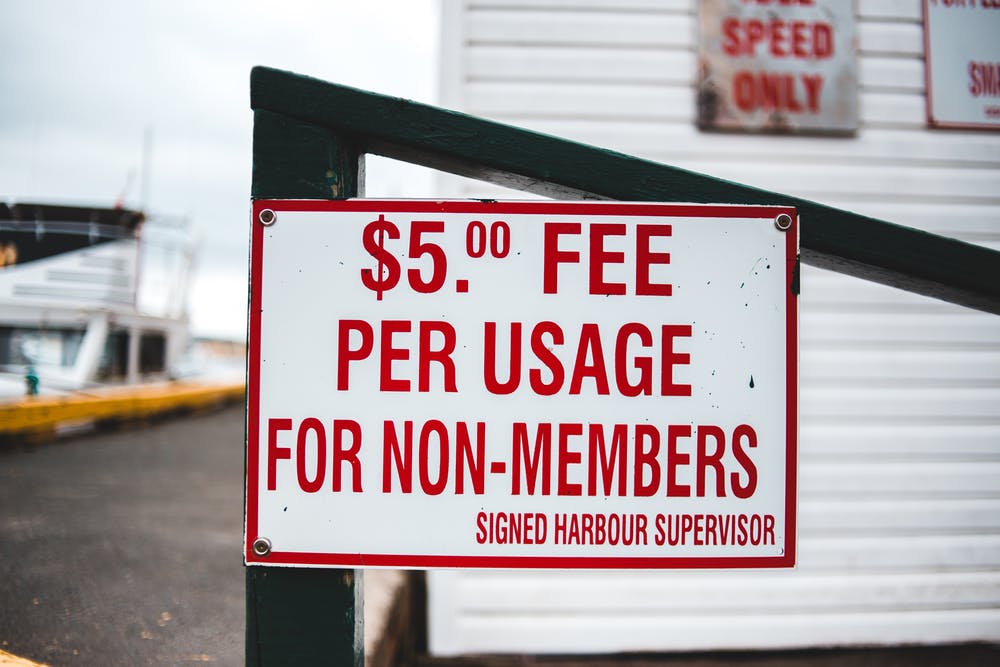Banks have become a place of refuge to store money considerably safer than under our pillow/mattress like back in the day. The safety we get from keeping our monies safe (well, safe to the extent to which they do not liquidate) comes at a cost that this post intends to pay attention to to save you some money.
The average American doles out a fee ranging from $4 to $25/month for account maintenance fees which roll up to $25 – $300 annually, gradually creeping out unnoticed from your vault.
While there are several angled bank fees the bank creep on you, most of them are very easy to avoid. Let you stake a deep dive into the nine common bank fees often overlooked by customers.

Photo credit: Erik Mclean (pixaby.com)Table of Contents
Common Overlooked Bank Fees
The following are nine common bank fees you migh be overlooking at the expense of your finance.
1. Account Maintenance
Yes, let’s get apparent out of the list. The account maintenance fees are the most common fees everyone is aware of. It is a baseline fee ranging from $4-$25 monthly in Canada/USA to maintain your checking account (whatever maintain means to you).
How to avoid account maintenance fees
You may need to move your business to an online bank, where they typically charge zero in fees. In other cases, your traditional bank may require a minimum balance maintained throughout the month to waive your account maintenance fees
2. Overdraft and Overdraft Protection
Overdraft fees are an interest charged by banks to cover the amount you have withdrawn over your bank balance. The rates vary from bank to bank and are applied monthly or per-use rate.
The overdraft protection operates like a service fee the bank charges monthly to hedge you against overdraft fees. If you have a transaction exceeding your bank balance, you fall into overdraft, i.e., spending money you don’t own directly from your checking account.
How to avoid overdraft (protection) fees
It is simple—opt-out of this fee. $5/month ($60/yearly) is too much a cost for not keeping an eye on your bank transaction activities. You may want to review the use of your debit card as it mainly links to your checking account, so you control the chances of going delinquent.
The same principle applies to the overdraft itself. Avoid these like the plague because the interest rates on the amount owed differ from your credit card rates. See the table below for overdraft fees.
| Overdraft fees | ||
| Bank | Pay-as-you-use | Protection fee |
| BMO | $5 | $5 |
| CIBC | $5 | $4 |
| RBC | Unavailable | $5 |
| Scotiabank | $5 | $5 |
| TD Bank | $5 | $4 |
3. Bank Draft
Bank drafts are sometimes a necessary evil. You want to close your mortgage, and the traditional cheque takes five working days to clear, you would have to cut a bank draft to fulfill this transaction. This cost sits around $9 per draft up to a certain amount. The draft fee becomes more expensive as the draft amount increases.
How to avoid bank draft fees
You should ask for the closing costs well in advance from your lawyers, pay a cheque (if you have one) or do a bank transfer. Most vendors have gone digital these days and could accept alternate ways of payment.
4. NSF/Insufficient Funds
NSF bank fees in Canada are about $49 among mainline banks. Your bill payment could be short $1; the bank honors the bill temporarily and charges NSF fees.
Here is a note of caution. The bank will reverse the money at the end of the working day and decline the payment. You’d now owe $49 to your bank in addition to failed payment.
In addition, your bank then reattempts to make the payment 15 calendar days after the first failed payment, and if the situation is the same, the cycle continues, and you get another insufficient fee charge.
How to avoid insufficient funds fees
The main culprit, in this case, is your pre-authorized debits such as insurance premiums, mortgage payments, car loan payments, etc. These debts are arranged so that you are left without a choice but to set up pre-authorized debits from your bank.
5. Extra Account Transaction
Most people choose the minimum fees for their checking accounts, which is an intelligent decision to make but could result in the 16th Century British idiom “penny wise, pound foolish.” Accounts with lower transaction fees usually come with a monthly transaction limit. Invariably, after paying 1-2 payments and paying off your credit card fees, $1.25 is charged per transaction. I have seen a situation of $50/month (from the $4 monthly charge).
In the same vein, your Interac email transfers are capped to 2 free transfers per month, and then the $5 per Interac transfer kicks in.
How to avoid Extra account transaction fees
As someone taking responsibility for your finances, you need to determine your monthly transaction needs and switch to an account type that accommodates them. If your financial commitments require more than the free transactions offered for minimum account fees, you may want to step to the next level. It may be costlier in monthly fees, but you will save some money at the end of the month.
6. Wire Transfers and Foreign Transaction
Wire transfers attract a fee whether they are domestic or international wires. Depending on the bank, you may want to explore other options of paying, such as PayPal.
Foreign transaction fees are sometimes a curse. You pay a fee and have the bank tuck you up on the foreign exchange spread.
How to avoid Wire transfers and Foreign transaction fees
Most banks offer additional account opening in a different currency from your base currency. You may want to pre-purchase foreign currencies when they fluctuate (same principle as a stock purchase) and hold until you need them. It is a global world.
On the other hand, you may want to make transfers through your mobile app for wire transfers. In a bid to reduce in-branch visits due to staffing needs or in a bid to promote digital banking, banks in Canada have increased wire transfer fees done in person and reduced fees for mobile wire transfers.
7. Paper Statements
If it makes you reconsider your choice of a paper statement, you’d be saving a tree from being cut down in the Amazon forest if you’re able to switch to a paper statement. Some banks charge a fee for a paper statement. Be sure to check with your banking service provider.
How to avoid paper statement fees
Fairly simple! Switch to an online statement. There is no notable effect on the fold of the papers that earns it more credibility than online statements.
8. Check/Cheque Book
Who uses checks these days? Some vendors prefer it while the majority continue to accept other forms of payments. A checkbook of 25 leaves may cost up to $50, which turns out to be $0.50 per check issued.
How to avoid checkbook fees
While I am skeptical of third-party companies making checks for lower amounts, I encourage a step where you sign up for the highest account level and get a free checkbook before downgrading your account.
9. Savings Accounts
Many people may not be aware of this, but the reality is that there is a $5 charge each time you take money from your savings account. It will not matter to what use you have put it – transfer to RESP or transfer to Checking account to meet your financial need, you still get charged $5 per transfer out of savings account.
How to avoid savings account transfer fees
I believe no reader is storing up savings in a saving account promising 2% introductory interest. They are a scam. The inflation rate tops that amount, and you are losing money. I do not see a need to have a savings account. If you must save cash, put them in your TFSA but be mindful of your contribution room.
There you have the common bank fees and how to avoid them. For more money saving tips, check out the following related articles.

